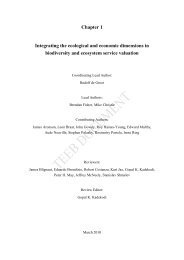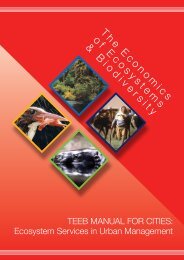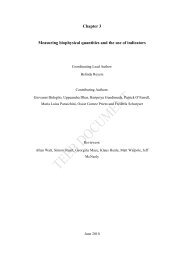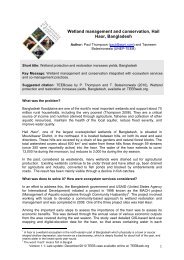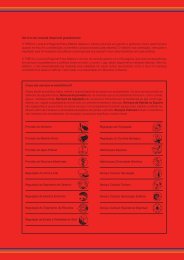Download (PDF, 6.71MB) - TEEB
Download (PDF, 6.71MB) - TEEB
Download (PDF, 6.71MB) - TEEB
You also want an ePaper? Increase the reach of your titles
YUMPU automatically turns print PDFs into web optimized ePapers that Google loves.
FRAMEWORK AND GUIDING PRINCIPLES FOR THE POLICY RESPONSE<br />
Most people would agree that other species have a<br />
right to co-exist with us on Earth and that it is important<br />
to maintain biodiversity in a state able to provide<br />
benefits to humans.<br />
The above statement raises ethical issues and<br />
practical questions of responsibility for policy<br />
makers. Should a landowner have to stop using part<br />
of his land to help a threatened species? Plant trees<br />
to protect freshwater resources? Be compensated for<br />
losses or reduced gains as a result of new biodiversity<br />
policies? Should people have to leave land to which<br />
they do not hold formally registered rights, even if they<br />
have lived there for generations? When a pharmaceutical<br />
company discovers an important drug derived<br />
from a plant species in a tropical rainforest, who will<br />
reap the benefits? The company? The country of origin?<br />
The forest people?<br />
At least three arguments support consideration of<br />
property rights and distributional impacts as an<br />
integral part of policy development:<br />
• reasons of equity: fairness in addressing changes<br />
of rights between individuals, groups, communities<br />
and even generations is an important policy goal in<br />
most countries;<br />
• taking distributional issues into account makes it<br />
much more feasible to achieve other goals when<br />
addressing biodiversity loss, particularly related to<br />
poverty alleviation and the Millennium Development<br />
Goals (see Table 2.2 above);<br />
Copyright by Scott Willis (USA).<br />
• there are almost always winners and losers from<br />
policy change and in most cases, loser groups will<br />
oppose the policy measures. If distributional<br />
aspects are considered when designing policies,<br />
the chances of successful implementation can be<br />
improved.<br />
Rights to use, manage or benefit from natural resources<br />
can take many forms (see Box 2.9).<br />
Box 2.9: How do ‘property rights’ apply to<br />
biodiversity and ecosystem services?<br />
‘Property rights’ is a generic term covering a bundle<br />
of different rights over a resource (P). Not all of these<br />
are necessarily held by the same person:<br />
• The Right to Use: A has a right to use P;<br />
• The Right to Manage: A has a right to manage<br />
P and may decide how and by whom P shall be<br />
used;<br />
• The Right to the Income: A has a right to the<br />
income from P i.e. may use and enjoy the fruits,<br />
rents, profits, etc. derived from P;<br />
• The Right of Exclusion: others may use P if<br />
and only if A consents:<br />
· If A consents, it is prima facie not wrong for<br />
others to use P;<br />
· If A does not consent, it is prima facie wrong<br />
for others to use P.<br />
• The Right to Transfer: A may temporarily or<br />
permanently transfer user rights to specific<br />
other persons by consent.<br />
• The Right to Compensation: If B damages or<br />
uses P without A’s consent, then A typically has<br />
a right to receive compensation from B.<br />
In addition, two rules are considered relevant to<br />
the concept of property rights:<br />
• Punishment Rules: If B interferes with A’s use of<br />
P or uses P without A’s consent, then B may be<br />
punished in an appropriate way;<br />
• Liability Rule: If use of P causes damage to the<br />
person or property of B, then A (as P’s owner)<br />
may be held responsible and face a claim for<br />
damages.<br />
Source: Birner 1999: 44<br />
<strong>TEEB</strong> foR NATIoNAL AND INTERNATIoNAL PoLICy MAKERS - ChAPTER 2: PAGE 16



